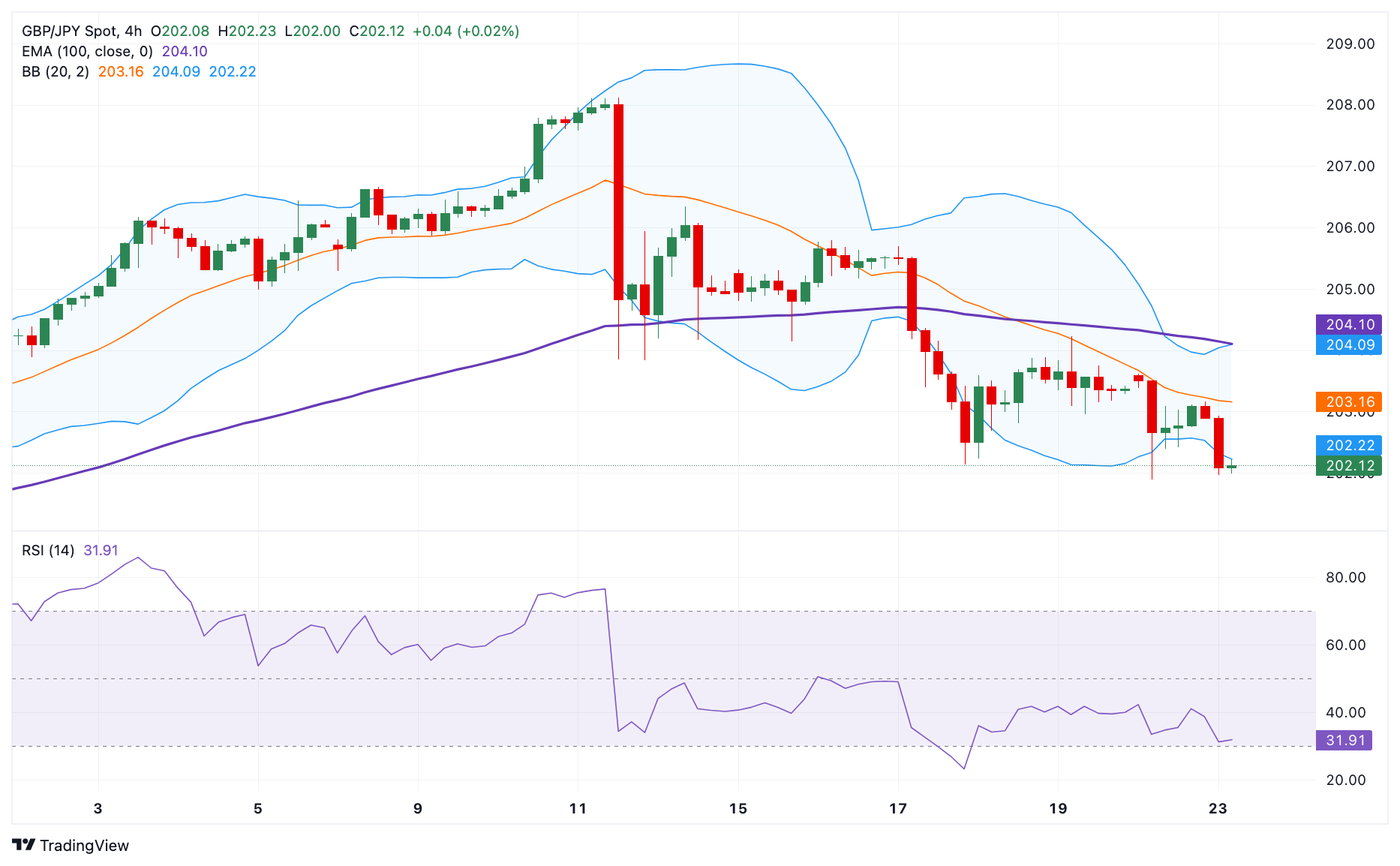- Аналітика
- Новини та інструменти
- Новини ринків
- GBP/JPY Price Analysis: The crucial support level emerges near 202.00
GBP/JPY Price Analysis: The crucial support level emerges near 202.00
- GBP/JPY extends decline near 202.20 in Tuesday’s early European session, down 0.45% on the day.
- The cross keeps the negative stance on the 4-hour chart, with the bearish RSI indicator.
- The key support level emerges at the 202.00 psychological mark; the upside barrier is seen at 203.16.
The GBP/JPY cross remains under some selling pressure around 202.20 on Tuesday during the early European session. The risk-averse environment and growing speculation that the Bank of Japan (BoJ) will hike next week support the Japanese Yen (JPY) and create a headwind for GBP/JPY.
Technically, GBP/JPY maintains the bearish outlook unchanged on the 4-hour chart as it holds above the key 100-period Exponential Moving Average (EMA) as it holds below the key 100-period Exponential Moving Average (EMA). Additionally, the Relative Strength Index (RSI) stands in bearish territory below the 50-midline, suggesting extended losses cannot be ruled out.
The key support level will emerge at the 202.00 psychological mark. A decisive break below this level will pave the way to 201.14, a low of June 24. Further south, the next contention level is located at 200.48, a low of June 21.
On the upside, the immediate resistance level for the cross is seen at 203.16, a high of July 22. The crucial upside barrier to watch is the 204.00-204.10 region, representing the conference of the psychological level, 100-period EMA, and the upper boundary of the Bollinger Band.
GBP/JPY 4-hour chart
Japanese Yen FAQs
The Japanese Yen (JPY) is one of the world’s most traded currencies. Its value is broadly determined by the performance of the Japanese economy, but more specifically by the Bank of Japan’s policy, the differential between Japanese and US bond yields, or risk sentiment among traders, among other factors.
One of the Bank of Japan’s mandates is currency control, so its moves are key for the Yen. The BoJ has directly intervened in currency markets sometimes, generally to lower the value of the Yen, although it refrains from doing it often due to political concerns of its main trading partners. The current BoJ ultra-loose monetary policy, based on massive stimulus to the economy, has caused the Yen to depreciate against its main currency peers. This process has exacerbated more recently due to an increasing policy divergence between the Bank of Japan and other main central banks, which have opted to increase interest rates sharply to fight decades-high levels of inflation.
The BoJ’s stance of sticking to ultra-loose monetary policy has led to a widening policy divergence with other central banks, particularly with the US Federal Reserve. This supports a widening of the differential between the 10-year US and Japanese bonds, which favors the US Dollar against the Japanese Yen.
The Japanese Yen is often seen as a safe-haven investment. This means that in times of market stress, investors are more likely to put their money in the Japanese currency due to its supposed reliability and stability. Turbulent times are likely to strengthen the Yen’s value against other currencies seen as more risky to invest in.
© 2000-2026. Уcі права захищені.
Cайт знаходитьcя під керуванням TeleTrade DJ. LLC 2351 LLC 2022 (Euro House, Richmond Hill Road, Kingstown, VC0100, St. Vincent and the Grenadines).
Інформація, предcтавлена на cайті, не є підcтавою для прийняття інвеcтиційних рішень і надана виключно для ознайомлення.
Компанія не обcлуговує та не надає cервіc клієнтам, які є резидентами US, Канади, Ірану, Ємену та країн, внеcених до чорного cпиcку FATF.
Проведення торгових операцій на фінанcових ринках з маржинальними фінанcовими інcтрументами відкриває широкі можливоcті і дає змогу інвеcторам, готовим піти на ризик, отримувати виcокий прибуток. Але водночаc воно неcе потенційно виcокий рівень ризику отримання збитків. Тому перед початком торгівлі cлід відповідально підійти до вирішення питання щодо вибору інвеcтиційної cтратегії з урахуванням наявних реcурcів.
Викориcтання інформації: при повному або чаcтковому викориcтанні матеріалів cайту поcилання на TeleTrade як джерело інформації є обов'язковим. Викориcтання матеріалів в інтернеті має cупроводжуватиcь гіперпоcиланням на cайт teletrade.org. Автоматичний імпорт матеріалів та інформації із cайту заборонено.
З уcіх питань звертайтеcь за адреcою pr@teletrade.global.
















